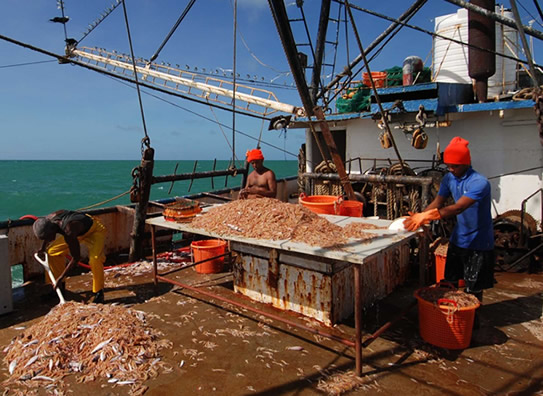20th November, 2020

The Working Groups of The Western Central Atlantic Fisheries Commission, the Caribbean Regional Fisheries Mechanism and the French Research Institute for the Exploitation of the Sea International will meet to discuss the USD $400 million shrimp and ground-fish fisheries
12 November 2020 – Bridgetown, Barbados - The Western Central Atlantic Fisheries Commission (WECAFC), the Caribbean Regional Fisheries Mechanism (CRFM) and the French Research Institute for the Exploitation of the Sea (IFREMER) Working Groups on Shrimp and Ground-fish in the Northern Brazil-Guianas Shelf will convene a virtual meeting on November 18 and 19 2020. The meeting hosted by the WECAFC Secretariat in Bridgetown, Barbados will gather an estimated 35 participants, including government officials and fishers’ representatives from Brazil, French Guiana, Guyana, Suriname and Trinidad and Tobago, as well as non-governmental organizations (NGOs) and FAO technical support staff. The main purpose of the meeting will be to review and discuss the final draft of the Sub-regional Fisheries Strategy and Management Plan, as well as review updates provided by the countries on the current status of development of their National Fisheries Management Plans.
The shrimp and ground-fish fisheries of the North Brazil-Guianas Shelf are amongst the most important fisheries in the WECAFC region. This extensive shelf from North Brazil to Trinidad and Tobago covers an area of more than 450 thousand square kilometers and is enriched by runoff from the various large rivers in the region, which include the Amazon and the Orinoco. Industrial and small-scale fishing fleets provide a significant source of livelihoods, food security and foreign exchange. In countries like Guyana and Suriname the fisheries primary sector contributes around 1.9 percent and 2.2 percent of gross domestic product (GDP), respectively. Overall, it is estimated that production in recent years of these resources in the North Brazil-Guianas Shelf amount to approximately 300,000 tons annually with an estimated value around USD 400 million. Many of the fisheries resources exploited such as shrimps, Atlantic sea bob, Southern red snapper, weakfishes and sea catfishes are intensively exploited and shared among countries in the sub-region, thus requiring international cooperation for the sustainable management of these resources.
The participants of the meeting will review monitoring and evaluation indicators for the shrimp and ground-fish fisheries and an update will be provided regarding the FAO Fisheries and Resources Monitoring System (FIRMS) in the region. Additionally, the meeting will discuss current advances on a study regarding working conditions and decent work in the shrimp and ground-fish fisheries. Finally, participants will update the 2020-2021 work plan and the recommendations that will be submitted for endorsement to the 18th Session of the WECAFC that is scheduled for the summer of 2021.
Dr. Fabian Blanchard, Convener of the IFREMER Working Group underlined that some shrimp and ground-fish resources in North Brazil, French Guiana, Suriname, Guyana, Venezuela, and Trinidad and Tobago are transboundary so that they are common and shared. He recalled that scientists and fishers from these countries meet regularly within the framework of the WECAFC/CRFM/IFREMER Working Group on Shrimp and Ground-fish in the Northern Brazil-Guianas Shelf to share and increase knowledge and finally provide scientific and management advice for the sustainable management of these resources.
He stated, “In 2019, efforts were made for stock assessments and increasing knowledge on the stock status. Therefore, the upcoming meeting will especially allow to make further steps towards sub-regional Ecosystem Approach to Fisheries (EAF) management and national implementation plans, to contribute to the preparation of a common data collection framework and to prepare a high-level meeting of Northern Brazil-Guianas fisheries authorities”.
Meanwhile, Dr. Yvette Diei Ouadi, Secretary of WECAFC commended the longstanding and effective collaborative framework with the CRFM and IFREMER not only through this working group, but also in other meetings that contribute the best scientific and technical information in other important fisheries for the wider Caribbean region, such as the Working Group on Fisheries using Fish Aggregating Devices (FADs).
She indicated, “This has been contributing to WECAFC’s objective of ensuring effective conservation, sustainable management and development of the living marine resources and address common problems of fisheries management and development faced by its 34 members. And more importantly preserving and enhancing the fisheries to ensure the livelihood of fisher-folks”.
For more information:
Yvette Diei Ouadi
FAO Caribbean Sub-regional Fishery and Aquaculture Officer
Secretary of WECAFC
Yvette.DieiOuadi@fao.org
Tel: 1-246-426-7110
Jeremy J Mendoza
FAO International Consultant
Project Coordinator FAO CLME+ shrimp and ground-fish sub-project
Jeremy.MendozaHill@fao.org
Tel: 1-246-426-7110
Marquita Sugrim
FAO National Communications Consultant
E-mail: marquitajuanne.sugrim@fao.org
Tel: 1-246-426-7110
